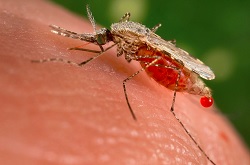 Final trial results reported in April showed that the efficacy of GlaxoSmithKline's ($GSK) investigational malaria vaccine wanes over time. But the candidate, dubbed RTS,S or Mosquirix, is the furthest along in the quest for a vaccine and so, may win WHO and EMA approval as the first vaccine against malaria.
Final trial results reported in April showed that the efficacy of GlaxoSmithKline's ($GSK) investigational malaria vaccine wanes over time. But the candidate, dubbed RTS,S or Mosquirix, is the furthest along in the quest for a vaccine and so, may win WHO and EMA approval as the first vaccine against malaria.
The WHO has committed to a decision by the end of the year on the vaccine. GSK submitted Mosquirix for EMA review in July 2014, and the agency is "expected to decide soon" if it should be licensed, Reuters reported.
According to unnamed sources quoted by Reuters, Mosquirix is likely to be approved "partly thanks to the weight of history pushing for the world's first malaria vaccine." CEO Andrew Witty has promised it won't be expensive and sources say they've been told to work with a price of about $5 per dose, Reuters reported. But it has certain issues that could complicate its use and drive up its cost.
First of all, unlike the measles vaccine, which confers lifelong immunity, Mosquirix confers partial protection and only for a few years. In the Phase III trial, children who received three doses of the candidate were half as likely to contract malaria in the year after vaccination, but the protection declined significantly after four years. As for those who got a booster fourth dose, only 36% of clinical malaria cases were reduced after four years.
And that's the second problem: it's a multi-dose vaccine.
"In the absence of four doses, the efficacy disappears and no significant protection is documented," said Pedro Alonso, director of the WHO's Global Malaria Program, in a briefing. "It's challenging in terms of understanding how it would best add value."
Another worry is that it could be more expensive if it's recommended for older infants. If it were recommended for babies up to three months old, it could be administered under the Expanded Program on Immunization with relatively low costs.
With these challenges in mind, Dr. Alan Magill, director of the Gates Foundation, which backs the vaccine, told Reuters that the vaccine isn't a "silver bullet," but another weapon in the arsenal against malaria. And he's not the only one who thinks so. "Malaria vaccines are not the whole answer, but they are part of the answer," Ashley Birkett, director of the Malaria Vaccine Initiative, told FierceVaccines last November.
- here's the Reuters story
Special Report: The top 5 vaccine makers by 2013 revenue - GlaxoSmithKline